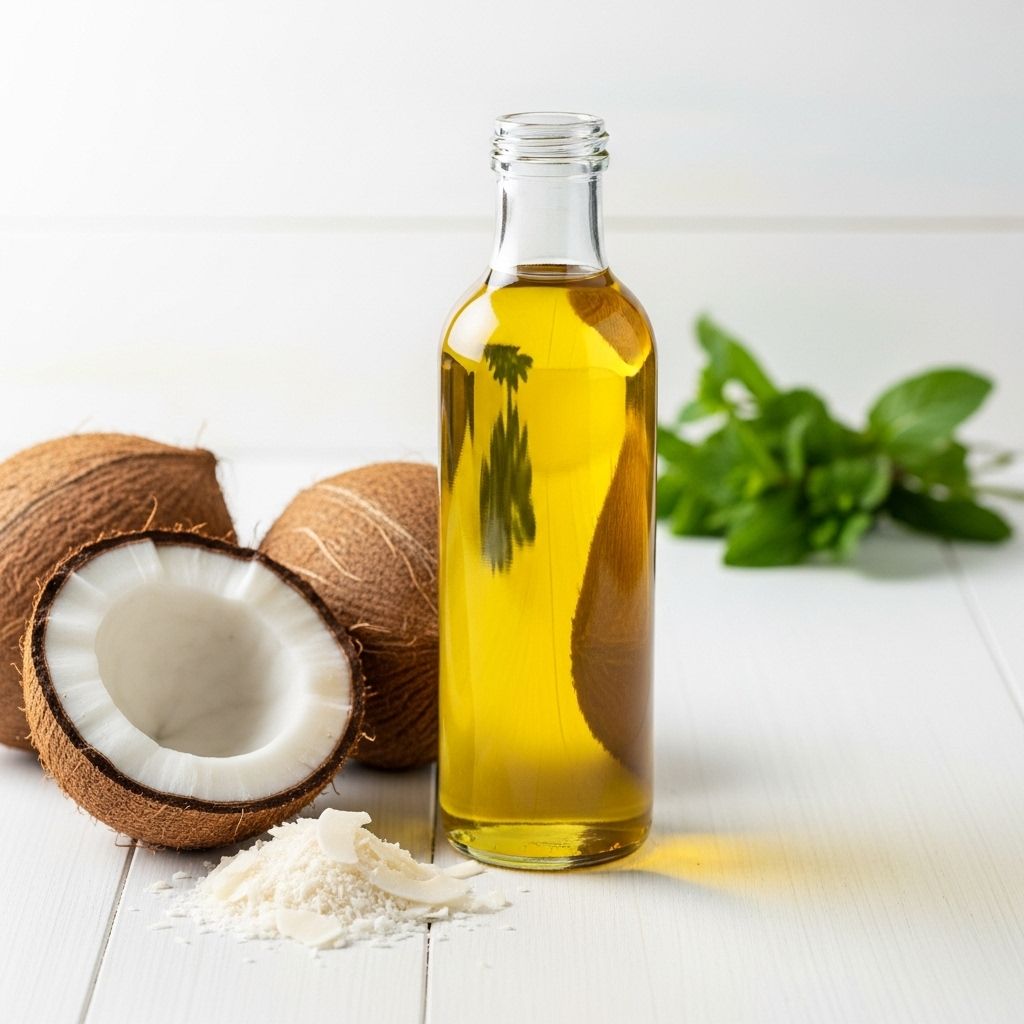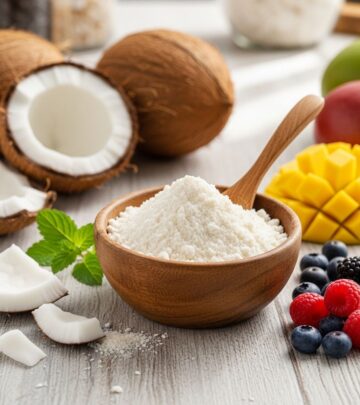MCT Oil: Science-Backed Benefits, Uses, and Side Effects
Harness efficient fat-based fuel to power workouts, sharpen focus, and support digestion.

Medium-chain triglyceride (MCT) oil has rapidly gained popularity in the health and wellness community for its unique ability to provide quick energy, promote weight management, and support both cognitive and digestive health. Extracted typically from coconut or palm kernel oil, MCT oil is comprised of medium-length fatty acids that are easier for the body to absorb and convert into energy compared to long-chain triglycerides (LCTs) found in other types of fats. This article takes a comprehensive look at the main benefits, uses, dosage recommendations, potential risks, and frequently asked questions surrounding MCT oil.
What Is MCT Oil?
MCT oil is a purified source of fats known as medium-chain triglycerides. Unlike long-chain triglycerides present in most dietary fats, MCTs contain 6–12 carbon atoms, allowing for rapid digestion and absorption. The main types of MCTs are:
- Caproic acid (C6:0) – rarely present in significant amounts due to its unpleasant taste and odor.
- Caprylic acid (C8:0) – renowned for fast conversion into ketones and energy.
- Capric acid (C10:0) – also quickly metabolized by the liver.
- Lauric acid (C12:0) – converted more slowly, but possesses notable antimicrobial properties.
MCT oil typically contains a blend of C8 and C10, sometimes with small amounts of C12.
How Does MCT Oil Work in the Body?
MCTs are metabolized differently from other fats. Due to their shorter chain length, they travel quickly from the gut to the liver, where they can be converted into ketones—an alternative energy source for the brain and body, especially when carbohydrate intake is low. Unlike LCTs, MCTs do not require bile for digestion, making them easier to absorb for many individuals.
Top Science-Backed Benefits of MCT Oil
1. Quick and Sustained Energy Source
MCT oil is rapidly absorbed and efficiently converted into energy, making it popular among athletes and those on ketogenic diets. Unlike carbohydrates, which can cause blood sugar fluctuations, MCT oil provides a sustained energy release, supporting both physical endurance and mental clarity.
- Brain Fuel: MCTs, especially C8, support mental sharpness by generating ketones, which the brain can use in place of glucose, improving focus and memory recall in both healthy individuals and those with cognitive impairment.
- Workout Enhancement: Many athletes use MCT oil as a pre-workout supplement to provide lasting energy without the crash associated with carbohydrate-rich snacks.
2. Weight Management and Fat Loss
Several studies suggest that substituting LCTs with MCTs may increase energy expenditure and promote satiety, helping to reduce overall calorie intake. Potential mechanisms include:
- Appetite Regulation: MCT oil helps control cravings by promoting the release of hormones associated with feeling full.
- Increased Calorie Burning: MCTs may modestly elevate the body’s metabolic rate, leading to a higher calorie burn throughout the day.
- Fat Oxidation: The rapid oxidation of MCTs supports fat loss when part of a calorie-controlled or ketogenic diet.
3. Potential Support for Cognitive Health and Neurological Conditions
MCT oil and dietary ketosis have been investigated for their potential to support brain health, particularly in neurodegenerative conditions:
- Alzheimer’s Disease: Ketones generated from MCT oil may improve memory, cognition, and brain function in individuals with early to moderate Alzheimer’s disease by providing an alternative fuel when glucose metabolism is impaired.
- Epilepsy: MCT oil, as part of a ketogenic dietary regimen, has been shown to reduce seizure frequency in drug-resistant children and adults.
- Autism: Preliminary research combining MCT supplementation with a ketogenic diet showed improvement in core autism features in children, though further studies are needed.
4. Antimicrobial and Gut Health Benefits
Certain MCTs, notably lauric acid (C12), have antimicrobial and antifungal properties, helping to suppress the growth of harmful microorganisms such as Candida albicans and some bacteria. Other ways MCT oil may support gut health include:
- Fostering the growth of beneficial gut bacteria.
- Potentially reducing gastrointestinal discomfort in people with fat malabsorption, pancreatic issues, or after certain types of abdominal surgery.
5. Blood Sugar Regulation and Diabetes Support
MCT oil may assist with blood sugar management by improving insulin sensitivity and reducing fat accumulation, particularly in the liver. While more robust research is needed, some studies suggest:
- People with type 2 diabetes may experience improved insulin resistance and moderate weight loss with MCT oil supplementation.
- MCTs may help enhance cognitive function during hypoglycemia in those with type 1 diabetes.
6. Potential Heart Health Benefits
Including MCT oil in the diet, within a calorie-controlled plan, can:
- Support weight loss, lowering key cardiovascular risk factors such as obesity and metabolic syndrome.
- Potentially improve cholesterol profiles by reducing LDL (“bad”) cholesterol and increasing HDL (“good”) cholesterol, though evidence is still emerging.
MCT Oil Compared to Other Fats
| Type of Fat | Chain Length | Primary Food Sources | Key Benefits |
|---|---|---|---|
| MCTs | 6–12 carbons (Medium) | Coconut oil, palm kernel oil, dairy | Quick energy, supports ketosis, easier absorption |
| LCTs | 13–21 carbons (Long) | Olive oil, canola oil, nuts, animal fats | Rich in essential fatty acids, slower digestion |
| SCTs | Fewer than 6 carbons (Short) | Butter, some fermented foods | Gut health, fuel for colonocytes |
How to Use MCT Oil
MCT oil is highly versatile and can be included in the diet in various ways:
- Added to coffee or smoothies (bulletproof coffee is a popular example)
- Stirred into salad dressings or drizzle over vegetables
- Used as a pre-workout energy booster
- As a supplement for those on a ketogenic or low-carb diet
Tip: Start with 1 teaspoon per day and gradually increase to 1–2 tablespoons, as some people experience digestive discomfort with larger initial doses.
Recommended Dosage and Safety
- Typical Intake: 1–2 tablespoons per day is generally considered safe for most healthy adults.
- Start Low, Go Slow: Begin with smaller amounts to assess tolerance and reduce risk of digestive upset.
- Consult a healthcare provider before using MCT oil if pregnant, breastfeeding, managing chronic health issues, or planning to give it to children.
Potential Side Effects and Risks
- Digestive Upset: High doses may cause diarrhea, stomach cramps, nausea, or bloating, especially when first starting use.
- Calorie Density: At 115–130 calories per tablespoon, using excess MCT oil can lead to unwanted weight gain without dietary adjustments.
- Lipid Profiles: Some individuals may experience changes in cholesterol; periodic lipid monitoring is advised for those using MCT oil regularly.
- Not Suitable for All: People with liver disease, certain metabolic disorders, or fat malabsorption syndromes should avoid MCT oil unless supervised by a physician.
Who Should Use MCT Oil?
- Those Following Ketogenic or Low-Carb Diets: To increase ketone levels and energy on low-carb regimens.
- Athletes and Fitness Enthusiasts: For quick, sustained energy without blood sugar spikes.
- Individuals Requiring Easy-to-Absorb Fats: Including those with pancreatic insufficiency, short bowel syndrome, or certain digestive disorders.
- People Seeking Appetite Control: As a tool to promote satiety and support weight management goals.
Note: Always consult with a healthcare professional before beginning a new supplement, especially if you have underlying health conditions or are pregnant/nursing.
Precautions and Interactions
- MCT oil should supplement, not replace, a balanced and varied diet.
- Monitor for digestive side effects when first introducing the oil.
- Individuals with certain genetic disorders affecting fat metabolism should avoid unsupervised use.
- May interact with some cholesterol- or fat-absorption-altering medications.
Frequently Asked Questions (FAQs)
Q: Can MCT oil help with weight loss?
A: MCT oil may promote modest weight loss by increasing feelings of fullness, slightly boosting metabolism, and supporting fat burning, especially when combined with a reduced-calorie or ketogenic diet. Results can vary based on overall diet and physical activity.
Q: Is MCT oil good for brain health?
A: MCT oil is known for its ability to generate ketones, which can provide an alternative source of fuel for the brain. Some studies suggest benefits for cognition and memory, especially in people with Alzheimer’s disease or mild cognitive impairment.
Q: How do I use MCT oil in my daily routine?
A: Start with 1 teaspoon added to coffee, smoothies, yogurt, or salad dressings, and gradually increase as tolerated. Avoid using it for high-heat cooking, as MCT oil has a low smoke point.
Q: Are there any risks associated with MCT oil?
A: Some people experience digestive issues, especially when starting or taking large doses. MCT oil is calorie-dense and may affect lipid levels in some individuals. People with specific metabolic or liver conditions should consult a healthcare professional before use.
Q: Who should avoid MCT oil?
A: People with liver disease, certain metabolic disorders, or allergies to coconut or palm oil should avoid MCT oil unless directed by a doctor. Its use in children or pregnant women should be medically supervised.
Takeaway
MCT oil is a valuable addition to many health routines, offering science-backed benefits for energy, metabolism, brain function, and gut health when used appropriately. Always start slow, use in moderation, and consult your healthcare provider for personalized recommendations.
References
- https://ancientandbrave.earth/blogs/news/the-ultimate-guide-to-true-mct-oil
- https://www.bubsnaturals.com/blogs/creamers/understanding-how-mct-oil-works-a-comprehensive-guide
- https://resources.healthgrades.com/right-care/food-nutrition-and-diet/mct-oil-benefits
- https://www.webmd.com/diet/mct-oil-health-benefits-common-uses
- https://www.healthline.com/nutrition/mct-oil-benefits
- https://thecoconutcoop.com/your-ultimate-guide-to-the-benefits-of-mct-oil/
- https://pmc.ncbi.nlm.nih.gov/articles/PMC9579472/
- https://draxe.com/nutrition/mct-oil/
Read full bio of medha deb













